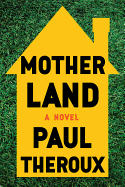
A familiar cringe may occur when reading Paul Theroux's sprawling family drama Mother Land. The well-known author of both fiction (The Mosquito Coast) and travelogue nonfiction (Deep South) delivers what is perhaps his most personal novel: an engrossing, emotionally tangled and often merciless examination of family and self.
Theroux builds his characters around the seasons of their Cape Cod hometown, including seven bickering siblings, a bemused father and, at the center of it all, a scheming matriarch, who is simply referred to as "Mother." From the onset, it's clear this New England family is unwieldy and dysfunctional, characterized by "a noiseless bewilderment and uncertainty, the vibrant presence of low-pitched rivalries." These muted tensions break open in adulthood as the brothers and sisters try to escape the grasp of family life. Nowhere is this break more painfully clear than when the narrator--a writer who bears a striking resemblance to Theroux--has one of his books ripped apart in a review written by his own brother Floyd, a poet and professor.
The hostility is rendered with Theroux's trademark perceptiveness, if a bit more bitterly here than in other works. There are times he exhausts his own conceits, such as the comparisons of Mother to a cold-blooded queen or his siblings to feuding tribes-people, but mostly his prose succeeds. It excels when evoking the setting and weather. With painterly effect, he ties the Cape's harsh winters, muddy springs and splendid summers to the changing moods of his characters' relationships. Mother Land is a bittersweet, brutally frank family saga that offers enough redemption to make the journey worth it. --Scott Neuffer, freelance journalist, poet and fiction author

